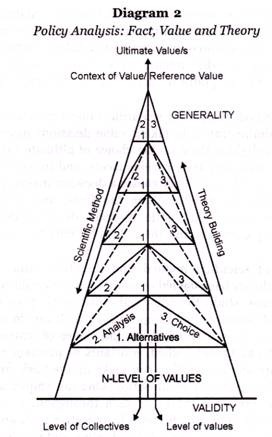ADVERTISEMENTS:
Facts, values and theory are closely interrelated in the study of research of politics. They all make up the structure of political or policy analysis which itself is built of behaviouralism, scientific method, and scientific value relativism. A dynamic theory is based on that structure. A political actor or scholar analyses political decisioning or policy-making in a scientific manner.
Diagram 2. below displays the whole process of analysis. Decision-making (or policy-making) process is shown by triangles.
Every triangle consists of three arms:
(i) Multiplicity of alternatives,
(ii) Factual analysis of these alternatives under given constraints, and
(iii) Choice or determination of one alternative.
The final decision taken by political actors or groups has been shown by number ‘1’ put on the top of triangles. This decision-point, besides available facts, pertains to their values.
The decision-point of every lower triangle is taken under the decision-point of higher and bigger triangle. Lower decision-values follow higher decision-values. Sometimes, lower decision-points are taken directly on the basis of next higher decision-points. This non-hierarchical relationship is shown by triangles demarcated by broken lines. In the analysis of all political decisions, finding and observation of available facts through Scientific Method make up the basis. Every value-laden decision or event is analysed in the context of values upheld at the higher level.
ADVERTISEMENTS:
As a political theory ascends higher, it tends to enlarge its scope or generality. But its attachment with the facts observed by scientific method leads it to validity. Those who want to maintain a balance between generality and validity stand in the middle. The choice concerns with the value-judgement of a political actor or a theorist interested in policy-analysis.
Scientific method along with scientific value relativism can help the politicians and administrators in taking value-decisions based on relevant facts. It can also enlighten them on the choice of ultimate values or higher policy matters by analysing their various facets, and implications for them and the milieu. The political theory guides a decision-maker, if the political actors seek its help in understanding the facts, and anticipating and controlling the coming events. The diagram depicts internal political decision-making by triangles, and the political theory by outer enveloping triangle.
Absorption of scientific method and scientific value relativism in modern political theory has enabled scholars to analyse values to a limitless level. They can now study threadbare the historical, personal, real and possible aspects of various values. Empirical research can do a lot in finding out some universal elements underlying the values of justice, liberty and equality.
ADVERTISEMENTS:
Similarly, as Brecht wished, constants or permanent elements of ‘human nature’ are discovered, they can make up the basic material of any political theory, law, policy or organisation. One can empirically know and analyse the ‘most preferred values’ of man throughout a country or the whole world. One can verify the findings by objective tools and techniques. In this manner, a large part of philosophical values and problems have come within the purview of modern political theory. Its scope is likely to expand still further.
Modern political theory, thus, has given up its impotence and silence over the problem of values, which was its hallmark during the two World Wars. It has arisen in an active and militant manner against the ideologies, which sell and propagate their claims and idiosyncrasies as scientific values and verified facts. It can analyse their means, causes and consequences.
The modern theorist, while remaining neutral towards values, can conduct dispassionate research and scientific analysis. He can analyse both ‘is’ and ‘ought’ separately, and also present relevant data in support of his preferences derived from empirical study of human nature.
ADVERTISEMENTS:
Political Science as a discipline can now tell what type of political action can give greater guarantee for ensuing human welfare. A polity can realise what it wants, and escape from the results which it does not like. Scientific value relativism is in a position to expose the actual meaning and possible results hidden behind populist slogans and vaguely-written manifestos. It can make out where would their consequences lead a people.
It can be regarded as a weapon against harmful political ideologies and for the defence of human freedom and values. Scientific value relativism and method (SVRM) does not prohibit any person or group to learn and adopt values from religion, nature, intuition, etc.
What it wants is that they should be separately indicated. SVRM will explain them, and let all know their consequences in the prevailing context. This will enable them to maintain, reject or modify them, and take adequate steps for future. It can go beyond discussing meaning and implications to adequacy of means. Ideals like equality, liberty, culture, etc., also fall under these categories.
Both protagonists of values and value relativists accept the importance of values, and accord central place to them in their studies, but with a basic difference. Value protagonists begin and end with values picking up methods and techniques useful in support of their stand. Scientific value relativists stick to the scientific method from the start to end. They reach conclusions after making investigation and analysis through scientific method.
They treat values as ‘preferences’, which are discovered on the basis of observation and objective inquiry. For them, SVRM does not and cannot advocate a particular set of ultimate values as true and valid for all human beings, except the assumptions underlying the procedure of scientific method which do not vitiate the findings arrived at or from debarring anyone to challenge, in part or whole, the venture itself. In fact, it is a weapon of truth and reason to fight against falsehood, superstition, ignorance, oppressive ideologies, and vested interests. If it is improperly used, it can disown the wielder of the weapon himself.
